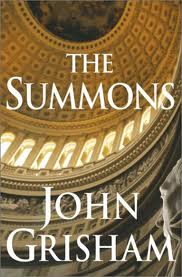 Writing For the Money
Writing For the Money
Grisham, John (2002). The Summons. New York: Random House.
A lawyer in Mississippi finds three million dollars in cash in his father’s house after the old man dies. The money is not mentioned in the will, and there is no obvious way the judge could have amassed that much cash. Should the lawyer declare it to the IRS and lose half in taxes, as the law requires, or quietly split it with his no-good, loser, drug-addict brother who would probably use it to overdose, or should he just stuff it into the trunk of his car and keep quiet? Choice number three, obviously. But threatening notes appear, followed by break-ins and fires. Somebody knows about the money and wants it.
That is a pretty good set up, because it’s a nice fantasy everyone has had, finding a hoard of cash, and a good question, what would you do with it, with respect to the law, with respect to family, and especially, what would you do if your life was threatened by having the loot?
We can’t have the protagonist just buy houses, cars, and airplanes, because that’s not interesting. We can’t have him give half to the IRS, because that just rubs greed the wrong way. We could have him split it with his brother, but, again, that goes against the greed motive, and also, maybe he really does care about his irresponsible brother. But he has to do something. He cannot just drive around the south with the money in the back of his Audi for two hundred pages. Can he?
But that’s exactly what he does. The promise of the premise is not fulfilled. If the writing were lyrical and insightful, we might not care, but the writing is pedestrian, and also pretty clearly written by a committee. The plot wanders here and there, as if nobody were in charge of directing it, and the ending is incomplete and arbitrary. It was the old make-it-up-as-you-go method.
I’m not a Grisham fan, but I got the book on a remainder table to see how he works his magic. Unfortunately, there was no magic in this book, other than the author’s name. The writing is spare, competent, and kinetic, with few digressions into scenery, costumes, or characters’ interiors. That’s the formula that sells, apparently.
Also there were a couple of well-wrought moments of chilling suspense, when the protagonist receives threatening notes, that reveal the pursuer’s intimate knowledge of his movements and motives. The idea that someone is watching you that closely is frightening. It might have worked even better if the narrative had been first-person and the main character a little more reflective. This narrator is third-person, andoverall inert.
There is just nothing going on here. It’s a Grisham novel for the sake of a Grisham novel, and there is no artistic reason for it to exist.
